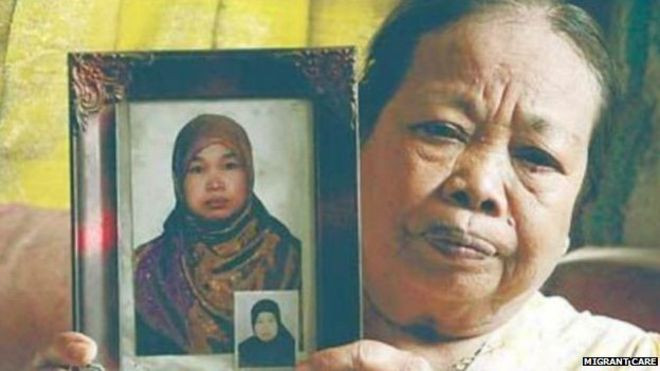Indonesian woman beheaded in Saudi Arabia for murder of 4-year-old girl

Saudi Arabia has executed an Indonesian domestic worker just days after beheading another woman from the country.
Karni binti Medi Tarsim was convicted of murdering a four-year-old girl in 2012, according to a statement from the Indonesian foreign ministry.
Her execution in Yanbu, western Saudi Arabia was carried out two days after another Indonesian woman was beheaded for murder.
The Indonesian foreign ministry has expressed anger that it was not given advance notice of the execution and has summoned Saudi Arabia's ambassador.
In a statement, the ministry expressed "regret and disappointment that representatives of Indonesia both in Riyadh and Jeddah did not obtain official information regarding the time and place of execution".
The day before her execution, Tarsim, from the Indonesia's main island of Java, was granted a visit by an Indonesian official. But neither the prison authorities nor the accused woman gave any indication the execution was to take place, the ministry said.
Anger at execution
Officials say the 37-year-old stabbed a four-year-old boy to death in the city of Yanbu in 2012. The victim's family refused to have her sentence commuted as they are entitled to do under Islamic law.
"The government of Indonesia has done its utmost to provide legal protection and has sought forgiveness from the victim's family with the aim of getting Tarsim's death sentence commuted," the foreign ministry said.
Despite Indonesia's anger at the executions of its citizens in Saudi Arabia, Jakarta is due to execute several foreign drug convicts, including Australians Myuran Sukumaran and Andrew Chan, in the face of growing international criticism.
Human Rights Watch called on Indonesia to suspend all planned executions – as the previous government did between 2008 and 2013. No executions were carried out in 2014, but earlier this year, six people – including five foreigners– faced firing squads.
"The executions of two Indonesian citizens in Saudi Arabia in a single week should be a turning point on the subject of death penalty in Indonesia," Andreas Harsono, the Indonesian researcher for Human Rights Watch told CNN.
Executions attacked
Before news of the second execution, the Indonesian Ministry of Foreign Affairs held a press conference to attack the Saudi decision.
When asked whether Jakarta's complaints were hypocritical, given the country's refusal to spare foreigners on death row, spokesman Arrmanatha Nasir said: "If you read our constitution, it is the job, the role of the government to protect its citizens, right? So it's not a double standard."
"On the issue of death penalty, we can have a long debate whether it is against human rights or it is morally wrong or right. That's a whole other discussion, that's a whole other argument, but what we're saying now here is we are implementing our laws and we are adhering to our constitution that we have to protect our citizens abroad."
© Copyright IBTimes 2025. All rights reserved.




















